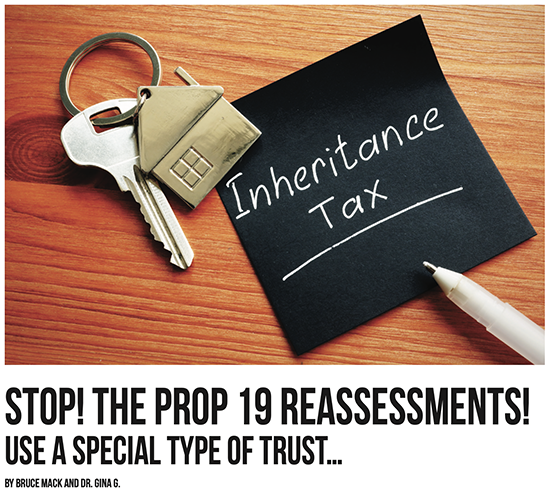STOP! The Prop 19 Reassessments! Use a special type of Trust…

By Bruce Mack and Dr. Gina G.
There is a viable solution for avoiding the pain and financial suffering Prop 19 has created and more. To better understand the problem, you will want to get the background.
In November 2020, Californians voted to pass the Proposition 19 Constitutional Amendment. The new law went into effect on February 16, 2021 (roughly 1 year ago). To understand the impact of Proposition 19 on apartment owners, it is helpful to recognize that it modifies Proposition 13 (which was originally passed back in 1978),
However, Proposition 19 has changed these rules in several ways, including:
- The exemption from reassessment for up to $1,000,000 in assessed value of property other than a primary residence transferred from parent to child or grandparent to grandchild has been eliminated completely.
- Apartment owners who have worked their whole life to build up a transferable estate are being punitively disadvantaged. Their apartment building(s) worth in many cases millions of dollars when passed down to their loved ones are being reassessed.
- Example: The average California County Assessors tax rate is 1.25%. So, for every 1 million in reassessment this means your heir(s) will have to pay an additional $12,500 a year in property taxes or over the following 10-year period and or every 10-year period thereafter that’s $125,000! If you pass on a portfolio of properties to you loved ones that has appreciated 10 million the reassessment would result in a staggering $1,250,000 over the following 10-year period etc!
- For many beneficiaries this is way too excessive and it’s forcing them to sell as a result of not being able to pay the steep additional County tax increases.
Additionally, we have discussions with many apartment building investors who are now considering selling but don’t want to due to the capital gains taxes they will incur. A 1031 exchange is a solution but trying to find a good replacement property these days is extremely difficult. Plus, we have witnessed over the years a trail of failed 1031’s that can’t be completed before the 45-day identification or sale deadlines, thus resulting in huge tax bills.
So, how can Apartment Owners transfer their holdings to their heirs without triggering a reassessment and without making their heirs responsible for a mountain of capital gains taxes?
The solution is to use a highly specialized type of “Non-Grantor Trust” that is not self-settled and that names the current owner as the Beneficiary (or one of several Beneficiaries). This type of specialized Trust is able to earn income from passive activities. In addition, this Trust can own investment properties, (such as rent and lease income that is earned from apartment buildings, single-family residences, or commercial property) and, pursuant to Section 643(b) of the Internal Revenue Code, defer the income tax liability in perpetuity — The income needs to be added to the corpus of the Trust (meaning it is not distributed to trust beneficiaries), and the trustee can use his or her discretion to declare the income as an extraordinary dividend. (The Trustee can still use the income for the Trust’s benefit, such as for buying other properties, lifestyle such as medical, maintance, support, education etc.)
By doing this, the current owner(s) of the property placed into trust would have a Non-Grantor, Irrevocable, Discretionary Trust that is not self-settled, established by a third-party settlor, and have the settlor name the current owner as a beneficiary. The current owner would then sell the property to the Trust and record that sale with the county without triggering a reassessment under Proposition 19.
The current owner’s heirs can then be added to the trust at any time. With this type of trust, the trust maintains the ownership of the property at all times, causing the capital gains that occur on a future sale to a third party to belong to the trust, not their heirs. Although the trust has the same basis as the current owner(s), this causes no issues for the trust. Under Section 643(a)(3) of the Internal Revenue Code, as long as the capital gains are added to corpus and declared by the trustee to be an “extraordinary dividend,” no capital gains will occur. This means that neither heirs nor the trust will have to pay capital gains taxes upon the sale of the property.
There is another important topic to discuss… when the properties are placed into this type of Trust, they become insulated from potential suitors. This provides absolute asset protection from liens, levies and judgements, and is a superior mechanism for holding properties rather than a LLC or other structure(s)!
This highly specialized type of trust is the subject of copyrights and is proprietary to Platinum Trust Group. You can learn more about how it can help you mitigate taxes and have ironclad asset protection by watching the livestream replay at www.PlatinumTrustGroup.com/AAGLA.
Bruce Mack, Licensed Financial Advisor, national speaker, author, real estate investor Co-Founder of PTG 702.371.2345 and Gina G., PhD, JD is a retired attorney and a graduate of Notre Dame Law School, PhD in Entrepreneurship and Business Strategy. Dr. Gina is also the Operations Manager of Platinum Trust Group. Bruce and his team of Trust Advisors and Tax Professionals are available to consult with you to determine if this proprietary Trust is a fit for your needs.



